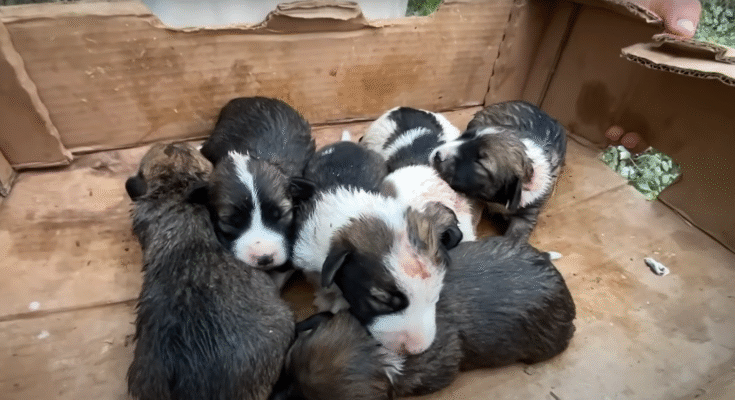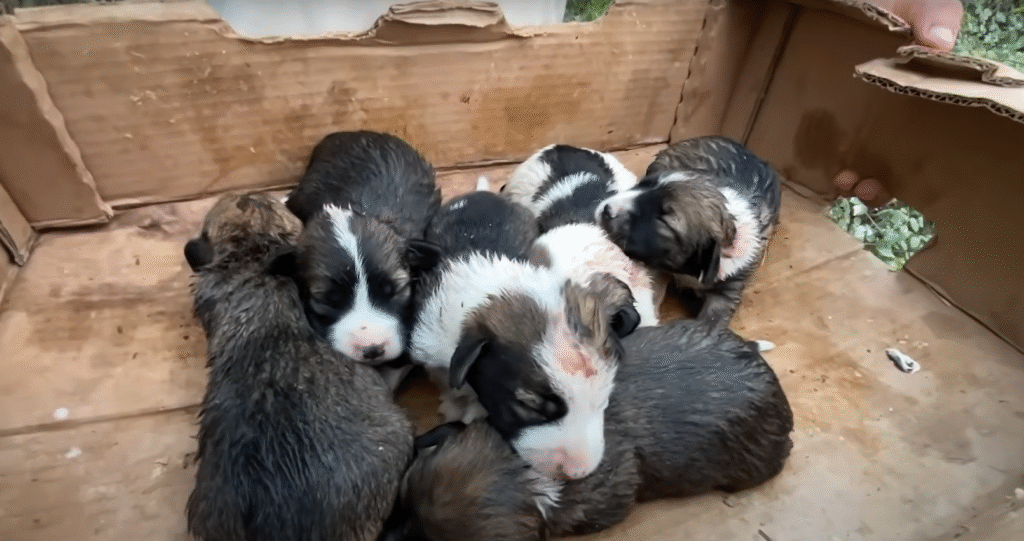
The forest was silent that afternoon, except for the distant hum of insects and the occasional rustle of leaves in the wind. My friend Lina and I were walking along a narrow dirt path, the kind that twists and turns between tall trees, when we first heard it — a faint whimpering sound. It was soft, almost hidden beneath the whispering of the forest, but it stopped us in our tracks.
“Did you hear that?” I asked, turning my head toward the sound.
Lina nodded, her brow furrowed. “It sounds like… puppies?”
We followed the noise, our footsteps careful against the uneven ground. As we pushed through a patch of overgrown grass, the smell hit us first — a mix of damp earth, rot, and something else. Then we saw them.
There, beneath a tangle of fallen branches and leaves, lay a small cardboard box. It was half-collapsed, soaked from previous rains, and inside it were four tiny puppies, their fur dirty and matted, crawling over each other weakly.
“Oh my God…” Lina whispered, crouching down.
The puppies were barely a few weeks old. Their bellies were swollen, their ears twitching. When one of them looked up, I noticed tiny black dots moving around its eyes. Fleas — dozens of them. Another had patches of missing fur, and a third was trying to scratch itself but was too weak to do more than whine softly.
“They’re infested,” I said, my stomach twisting. “We can’t leave them here.”
But the question was — where could we take them?
We lived nearby in a small camping area we had set up near the forest edge. We didn’t have a shelter, just a large tent and a few supplies. It wasn’t ideal, but it was the only safe place we could think of.
Without hesitation, Lina pulled off her jacket and laid it on the ground. Gently, we lifted the tiny, trembling puppies into it. They squirmed a little but didn’t resist — too weak, too tired. One of them licked my finger faintly, as if asking for help.
“Hang in there, little ones,” I murmured. “We’ve got you.”
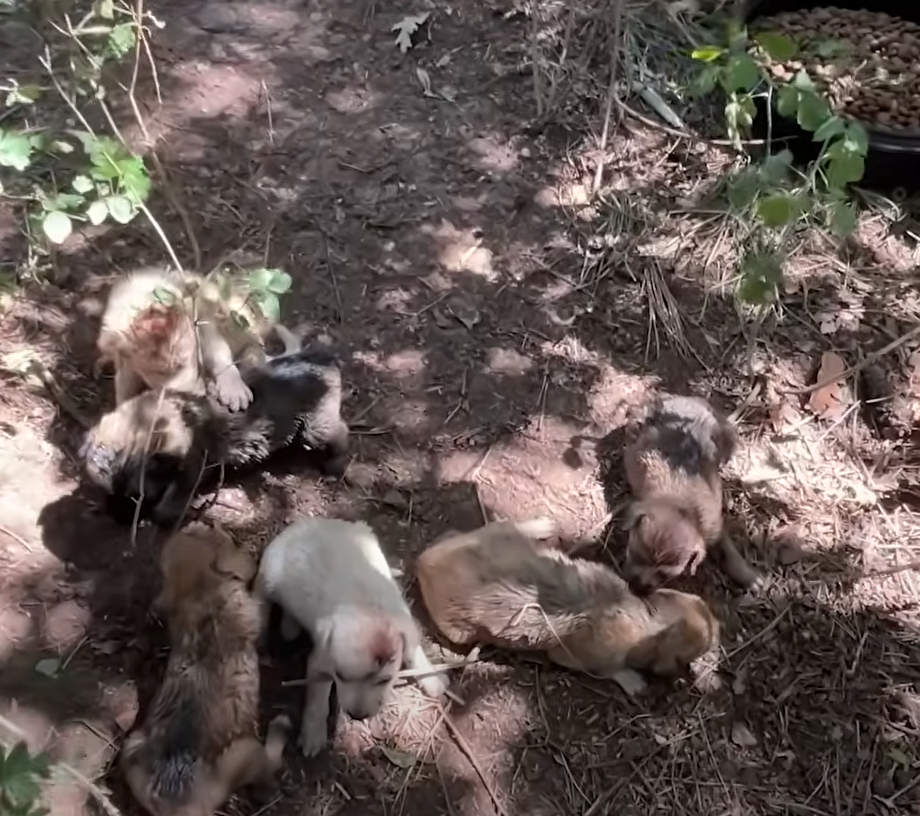
By the time we reached our tent, the sun was setting, painting the sky with streaks of orange and pink. We laid the puppies down on a soft blanket inside the tent and got a closer look at their condition. It was worse than we thought.
Fleas covered their fur like living dust. Their tiny bodies were crawling with movement. We could see sores on their skin, scabs where they had scratched themselves raw. They were starving, dehydrated, and scared.
Lina bit her lip, her eyes glassy. “If we don’t clean them up, they won’t make it through the night.”
We didn’t have much, but we had determination. We heated some water over our small camping stove, mixed it with a bit of soap, and prepared a makeshift washing basin using a bucket.
“Okay, one at a time,” I said, taking the first puppy — a little white one with a brown patch over its eye. It whimpered softly as I dipped it into the warm water. Fleas began floating to the surface instantly, black specks swirling in the bucket. It was horrifying, but also a relief to see them go.
Lina gently rinsed the puppy while I kept talking softly to calm it down. “You’re safe now, sweetheart. We’re going to take care of you.”
We did the same for the others — washing, drying, and wrapping them in clean cloths. Each bath took patience and care. When we finished, they looked cleaner, though still frail. Their eyes were brighter, their little tails wagging faintly as if they understood we were trying to help.
“Look,” Lina said with a small smile, “they’re already moving better.”
We made them a small bed using our spare towels, and I poured warm milk into a shallow bowl. The puppies sniffed at it curiously before lapping it up eagerly. Watching them eat was one of the most beautiful sights I had ever seen — tiny tongues lapping at life itself.
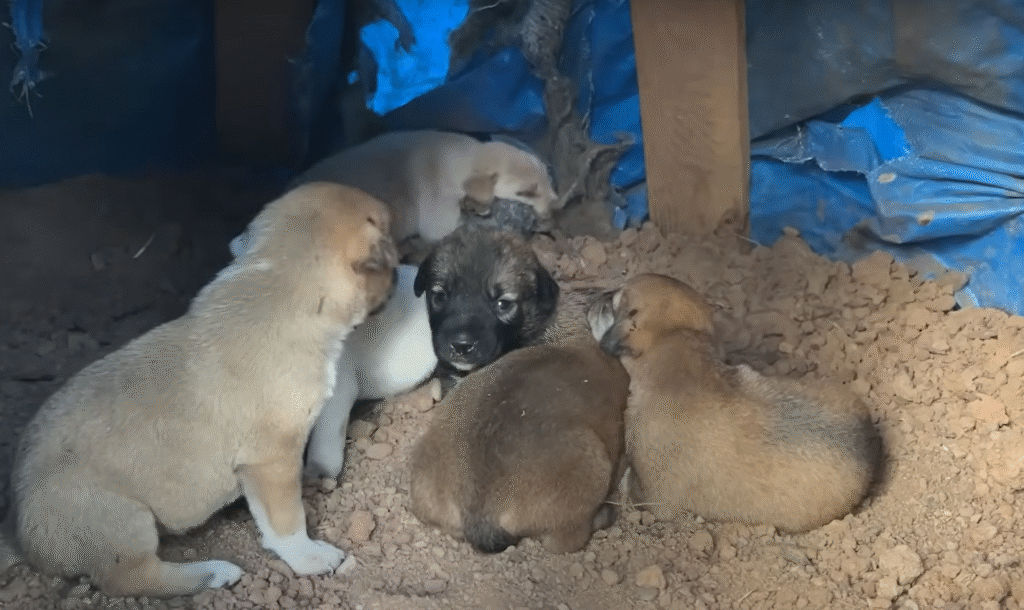
That night, the forest outside was dark and quiet, but inside our tent, there was warmth — not just from the lantern, but from the soft breathing of four rescued lives. They huddled close to one another, sleeping soundly for the first time in who knows how long.
Lina and I sat beside them, exhausted but relieved. “Can you believe someone just left them there?” she said, her voice low.
I shook my head. “People can be cruel. But maybe… maybe it happened so we could find them.”
She smiled softly at that, and for a while, we just listened to the tiny sounds of their sleep — the little sighs, the soft twitching of paws as they dreamed.
Over the next few days, the real work began. The infestation had weakened them badly, so we had to feed them small meals throughout the day — milk mixed with bits of rice and softened bread. We used a fine comb to remove more fleas each day, checking for ticks and treating their skin with natural oils we managed to get from a nearby shop.
Each morning, they greeted us with wagging tails and squeaky barks. Their personalities began to shine.
The smallest one, the white puppy with the brown patch, was the bravest — always the first to explore. We named him Scout. The black one with a white chest was Shadow, shy but incredibly sweet. The spotted one who loved to tumble and play was Pip, and the last, a soft golden pup with big eyes, became Sunny, because she brought light to our little camp.
Watching them heal was a miracle. Their fur grew soft and clean, their bellies round with food and safety. They began to chase butterflies, bark at leaves, and tumble over each other in play. The tent that once felt temporary now felt like a home — filled with laughter, movement, and the scent of life.
But it wasn’t always easy. Some nights, the temperature dropped, and we had to keep the puppies warm against our own bodies. We woke up every few hours to check on them, making sure none were getting cold or sick. The forest echoed with the sounds of the night — owls, crickets, the wind — but we felt safe, knowing we were doing something right.
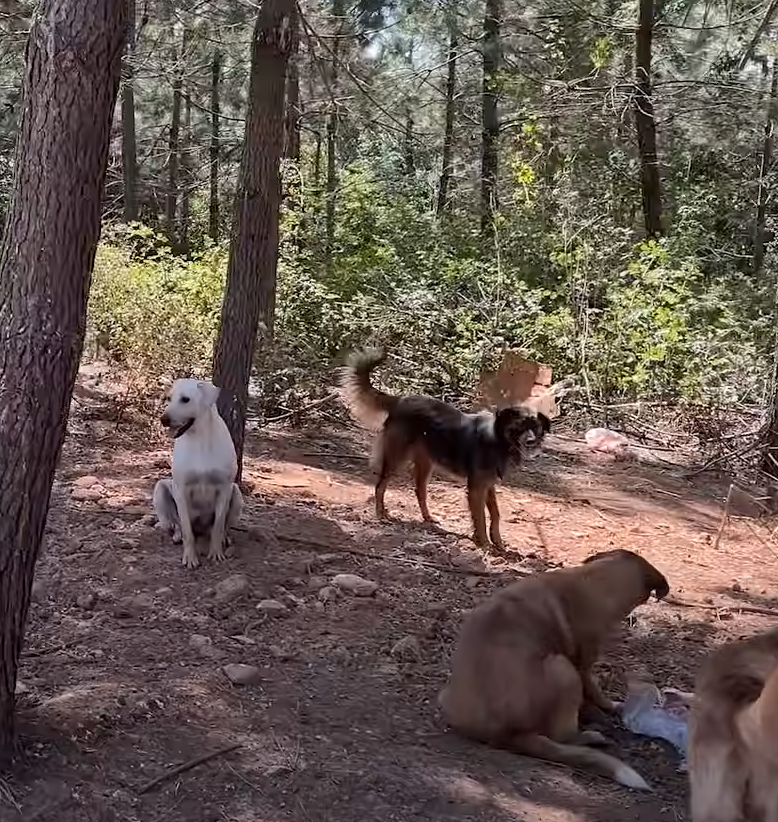
Then one morning, a woman from a nearby animal rescue center visited our campsite. She had heard about the puppies from a local who saw us buying supplies. She examined each one carefully, smiling.
“You’ve done a wonderful job,” she said kindly. “They’re healthy enough now to be taken to our shelter. We’ll get them vaccinated, and when they’re ready, we’ll find them loving homes.”
My heart twisted a little. I had grown so attached to them — their little barks, their excited jumps when they saw me. But I knew this was the best thing for them.
Before they left, I held each one close, whispering softly: “Be brave. Be happy. You’re safe now.”
Scout licked my chin one last time before being carried away.
Days later, the tent felt strangely quiet. I missed the chaos, the tiny paws, the morning yips. But when I visited the shelter a few weeks later, I was overjoyed to find out that all four had been adopted — each into a kind, loving home.
Standing there, looking at their photos on the adoption board, I felt something warm spread through my chest.
We had found them in a dark, damp corner of the woods — lost, infested, forgotten. But now, they had families, comfort, and love.
Sometimes I still walk that forest path, and I remember that day — the smell of the damp leaves, the faint cries that led us to them. That sound changed everything.
Because in saving those little lives, we found something precious too — the reminder that compassion is powerful, and that even in the quietest corners of the world, there are hearts waiting to be rescued.
And every time I think about Scout, Shadow, Pip, and Sunny, I smile and whisper, “We did it, little ones. We moved you from the woods to safety — and you moved us too, forever.” ❤️
